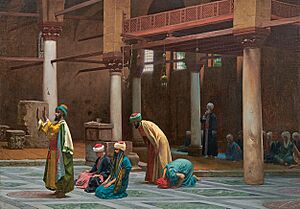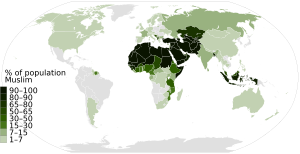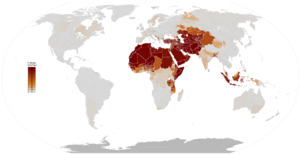Muslims facts for kids
Muslims are people who follow Islam, a religion that believes in one God. This God is called Allah in Arabic. Muslims believe that the Quran is the exact word of God, given to their main prophet, Muhammad. They also believe in earlier holy books like the Torah, Psalms, and Gospel, which are connected to Judaism and Christianity.
Today, there are about 1.9 billion Muslims around the world, making up about 25% of the global population. This means about one in four people on Earth is Muslim! Islam is the fastest-growing religion in the world.
Most Muslims belong to one of two main groups: Sunni Islam (75–90%) or Shia Islam (10–20%). The country with the most Muslims is Indonesia, but large Muslim populations also live in countries like India and China, even though Muslims are not the majority there.

Prayers in the Mosque by Jean-Léon Gérôme
|
|
| Total population | |
|---|---|
| c. 1.9 billion (25% of the global population) (Worldwide, 2020 Pew Research Center) |
|
| Regions with significant populations | |
| Indonesia | 244,410,757 |
| Pakistan | 242,500,000 |
| India | 194,810,000 |
| Bangladesh | 153,700,000 |
| Nigeria | 99,100,000 |
| Egypt | 95,000,000 |
| Iran | 82,900,000 |
| Turkey | 82,800,000 |
| Algeria | 42,000,000 |
| Sudan | 40,400,000 |
| Religions | |
| 80–90% Sunni Islam 10–20% Shia Islam ~1% Ahmadiyya ~1% Other Islamic traditions |
|
| Languages | |
| Arabic (also Sacred), Bengali, Hindustani, Indonesian, Persian, other South Asian languages, African languages, Southeast Asian languages, Turkic languages, Iranian languages, and other Muslim world languages | |
Contents
What Does 'Muslim' Mean?
The word Muslim comes from the Arabic word Islam, which means "submission to God." So, a Muslim is someone who submits to God.
For a long time, people in English-speaking countries often used the spelling "Moslem." However, this spelling is now rarely used. Many Muslims preferred "Muslim" because "Moslem" sounded like an Arabic word meaning "the oppressor." In 1991, a major news agency in the United States told its reporters to use "Muslim," and other news outlets followed.
In some parts of the world, like Central Asia and South Asia, people might use the word Mosalman instead of Muslim. In the past, some English writers also used Mohammedans or Mahometans. However, Muslims find these terms offensive because they suggest that Muslims worship Muhammad, instead of God.
The Quran (the holy book of Islam) uses the word muslim in a wider sense. It describes many prophets and their followers as Muslims because they submitted to God. For example, the Quran says that Abraham, Moses, and Jesus were all Muslims.
Becoming a Muslim
To become a Muslim, a person needs to say the Shahada. This is a declaration of faith and is one of the Five Pillars of Islam. It means saying that there is only one God (Allah) and that Muhammad is His messenger.
The Shahada is usually said in Arabic: ašhadu ʾan-lā ʾilāha ʾillā-llāhu wa ʾašhadu ʾanna muħammadan rasūlu-llāh. This translates to: "I testify that there is no god [worthy of worship] except Allah, and Muhammad is the messenger of Allah."
- In Sunni Islam, the Shahada has two main parts: believing there is no god but Allah, and believing Muhammad is God's messenger.
- In Shia Islam, a third part is often added, which honors Ali, an important leader in Shia Islam.
The Five Pillars of Islam
Muslims follow five main practices, known as the Five Pillars of Islam. These are:
- Shahada: The declaration of faith (as explained above).
- Salah: Performing daily prayers, usually five times a day.
- Zakat: Giving to charity to help those in need.
- Sawm: Fasting during the month of Ramadan from dawn to sunset.
- Hajj: Making a pilgrimage (a special journey) to the holy city of Mecca in Saudi Arabia, at least once in their lifetime if they are able.
Muslims in Islamic Belief
In Islam, whether someone is truly a Muslim is known only by God. People can declare their faith, but only God knows what is in their heart.
The Quran mentions many prophets from Judaism and Christianity as Muslims. This is because they all submitted to God and taught His message. These prophets include Adam, Noah, Abraham, Ishmael, Jacob, Moses, and Jesus. The Quran says that Jesus's followers also declared themselves to be Muslims.
Where Do Muslims Live?
Muslims live all over the world. The country with the largest Muslim population is Indonesia, home to about 12.7% of the world's Muslims. Other countries with many Muslims include Pakistan, Bangladesh, Nigeria, and Egypt.
About 20% of the world's Muslims live in the Middle East and North Africa. However, a huge number of Muslims also live in South Asia (like India and Bangladesh). Even though Muslims are a minority in India, it has one of the largest Muslim populations in the world.
Muslims are a young and growing population. They have the highest number of followers under the age of 15 compared to other major religions.
Muslim Culture
Muslim culture includes the traditions and ways of life common among Muslims and in historically Islamic areas. Over time, as Islamic empires grew, Muslim culture blended with and was influenced by many other cultures. These include cultures from Indonesia, India, Bangladesh, Nigeria, Egypt, Persia, Turkey, and many more. This mix has created a rich and diverse set of cultural practices around the world.
See also
 In Spanish: Musulmán para niños
In Spanish: Musulmán para niños
- Cultural Muslims
- Islamic schools and branches
- Lists of Muslims
- List of converts to Islam
- Islamic holidays
- Muslim world
- Persecution of Muslims
- Islam by country
 | Shirley Ann Jackson |
 | Garett Morgan |
 | J. Ernest Wilkins Jr. |
 | Elijah McCoy |



